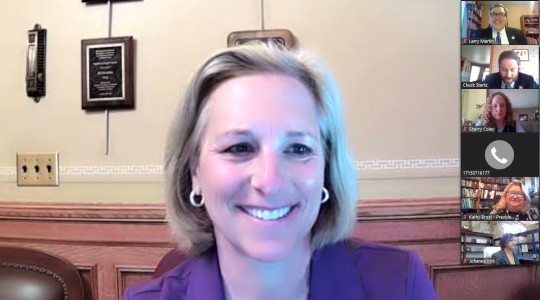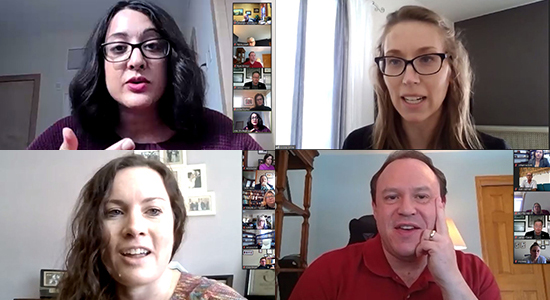
March 1, 2021 – The State Bar of Wisconsin’s Board of Governors last Friday (Feb. 26) voted to support a petition pertaining to the retention of circuit court case files and court records.
The Director of State Courts’ Records Management Retention Subcommittee filed a petition (20-08) to the Wisconsin Supreme Court, to amend and create rules that relate to the retention of circuit court case files, court records, minute records, and exhibits.
A
supporting memo notes that the subcommittee periodically reviews record maintenance and retention rules to ensure consistency with best practices for preserving the record while incorporating technological changes to record management.
The subcommittee, the memo notes, previously “reached consensus on modifying the Rules to retain criminal and juvenile delinquency case records according to how each case was disposed, to streamline and clarify the retention periods for family cases, to eliminate permanent retention for termination of parental rights and adoption case records, to eliminate ambiguity and promote consistency in the Rules relating to exhibits, and to clarify and promote consistency in the Rules relating to retaining a record or exhibit that has been electronically or optically stored.”
A major change would base the retention period on how a criminal case is ultimately “disposed.” Under current rules, retention is based on how criminal cases are “commenced,” or charged, even if the disposition is ultimately different.
The State Bar’s Criminal Law Section expressed general support for the petition and the Public Interest Law Section supports it, noting “it is fair and logical to retain and display cases according to their disposition, not the charging decision, because the disposition of the case represents a more accurate assessment of the seriousness of the violation.”
Krista Miller, legal advisor to the Office of Court Operations, clarified that court retention periods are not the same as display periods on the Wisconsin Circuit Court Access (WCCA) website, the court record system that is available online to the public.
For instance, while dismissed felonies are still retained by circuit court clerks under applicable file retention periods, dismissals
only display online for two years.
The Records Management Retention Subcommittee requested the State Bar’s support for the petition, and the board, after discussion, voted unanimously to support it.
The petition will now move forward with the State Bar’s full support. The supreme court will hold a public hearing on petition 20-08 on April 7, via videoconference.
Justice Karofsky Provides Opening Remarks

Wisconsin Supreme Court Justice Jill Karofsky, in her first term as the newest justice on the court, introduced herself and provided opening remarks Feb. 26 at the State Bar of Wisconsin’s Board of Governors (virtual) meeting.
Justice Karofsky, a former state and county prosecutor and circuit court judge (Dane County), said she’s still getting used to her new job in the midst of a pandemic.
She’s also trying to navigate her new office environment, including navigation within the maze that is the State Capitol Building, where she is working from her third floor office.
There’s a supply room on the first floor for restocking pens and legal pads. “I was shown that room and now I can’t find it,” she said. “There’s a learning curve. I work in a really big building, and I’m trying to figure out geographically where things are.”
Not that she’s complaining. “When I come into the Capitol, I get to walk up two flights of stairs,” said Justice Karofsky. It is exactly 63 steps. “Every single time I climb those steps and I reach the top where the Supreme Court is, I am just simply awe struck.”
“I think about Shirley Abrahamson and all of the times she must have crested those steps. I am just deeply honored to be up here, deeply honored to work in a place where someone like Shirley Abrahamson worked.”
Since taking the supreme court bench this term, Justice Karofsky said she has enjoyed diving more deeply into different areas of law, including eminent domain and trademark issues, zoning, civil commitments, and contract disputes.
Justice Karofsky said that amid COVID, it’s harder to meet people and have informal discussions with colleagues. But she notes an upside to this pandemic.
“I think it has made the court system more accessible to people,” she said. “I think it’s really great when the public can see how their Third Branch of government works.”
She noted that more than 20,000 people watched the Wisconsin Supreme Court’s oral argument in
Trump v. Biden, online through WisconsinEye.
Finally, Justice Karofsky highlighted the importance of collegiality and consensus-building among the justices, and dispelled common misperceptions.
“I do think there is a perception out there that perhaps we are seven people in seven different camps or seven people in three different camps,” she said.
But Karofsky noted that in the 16 opinions issued by the court thus far this term, seven were unanimous. In eight cases, Justice Karofsky was in the majority, and the majority consisted of different clusters of justices.
“I have learned how to have spirited discussions with my colleagues,” she said. And Justice Karofsky says each justice brings something different to the table.
“Different justices hold a different position, or think a different way, or look at a case through a different lens than I do,” she said. “I can learn more from that than I can, usually, from someone who agrees with my point of view.”
Justice Karofsky thanked the State Bar for its
stand against threats to Wisconsin’s judiciary last December and said she wants to use her position to help promote wellness among lawyers and judges in Wisconsin, “an issue of utmost importance.”
Board Declines to Support Videoconferencing Petition
The Director of State Courts filed a petition (20-09) to the Wisconsin Supreme Court to amend rules regarding where and how court is held, including holding court in alternative locations and requirements for using videoconferencing technology for both criminal and civil proceedings.
The Director of State Courts requested the State Bar’s support for the petition; however, the board voted 22-20 against supporting it. Some board members raised concerns about how changes may affect a defendant’s constitutional rights, including the right to confront witnesses.
A
supporting memo notes the significant use of videoconferencing technology to conduct court proceedings during COVID-19 and, likely, its continued use in the future.
The petition creates a provision establishing “statutory authority to hold court when the judge and some or all of the participants appear from remote locations outside of the courthouse using videoconferencing technology.”
Elizabeth Barroilhet, also with the Office of Court Operations, noted the amendments are intended to ensure clear authority and guidelines for use of videoconferencing technology moving forward, based upon what the courts have learned this past year.
For instance, proposed amendments would clarify technical and operational standards, allow courts to exercise discretion to determine whether a witness must be physically present, and establish time periods for objections to the use of videoconferencing.
While some board members agreed that videoconferencing can create efficiencies, others expressed concern that granting judges too much discretion to allow appearance by videoconferencing could potentially create constitutional issues.
“My concern is that the proposal pokes a hole in the right to have physical presence to confront,” said Michael Yang, a criminal defense attorney and the Wisconsin Asian American Bar Association liaison to the board.
Barroilhet said judges would have discretion to use videoconferencing, based on a number of factors, including the constitutional rights involved.
Dist. 9 Gov. Katie York (Madison) noted the State Public Defender’s Office has
submitted comments on the petition, raising concerns about due process rights.
She said videoconferencing can create efficiencies for minor hearings, but there must be careful consideration when a person’s liberty is at stake.
“I understand providing flexibility,” York said. “But different judges all over the 72 counties will interpret that differently … with varying degrees of allowing witnesses to appear by video.” She said credibility can be more difficult to assess by video.
The supreme court will hold a public hearing on petition 20-09 on April 7, via videoconference.
Boards Adopts Position on License Suspensions as Debt Collection Method
After lengthy discussion and various motions, the board adopted a proposed policy position relating to the practice of suspending a driver’s license and ordering warrants or incarceration for the purpose of collecting unpaid ticket debts. The policy states:
The State Bar supports efforts to end the practice of allowing courts to order driver’s license suspensions, warrants, or incarceration for the purpose of collecting debt for tickets, forfeitures, court costs, or criminal fines. Courts in Wisconsin have a wide range of other options for resolving nonpayment of debt.The State Bar supports efforts to end the practice of allowing courts to order driver’s license suspensions, warrants, or incarceration for the purpose of collecting debt for tickets, forfeitures, court costs, or criminal fines. Courts in Wisconsin have a wide range of other options for resolving nonpayment of debt.
Judges can and should provide statutory options such as community service, affordable payment arrangements, debt modification, and permanent stays. Recognizing the unjust, compounding harms created by these debt collection mechanisms, Wisconsin must stop using driver's license suspensions, warrants, or incarceration to collect debt for tickets, forfeitures, court costs, or criminal fines.
The State Bar’s Public Interest Law Section recommended the policy position, which is supported by the Criminal Law and Civil Rights and Liberties sections.

Krista Miller (top right), legal advisor at the Office of Court Operations, explained a petition regarding court file retention periods. NLRD representative Anu Chudasama (top left), Dist. 9 Gov. Katie York (bottom left), and Dist. 2 Gov. Ryan Billings (bottom right) added their perspectives during the board meeting.
The position allows the State Bar’s government relations team to lobby the Wisconsin Legislature on bills related to this issue, including provisions already introduced in the governor’s proposed state budget.
Dist. 10 Gov. Starlyn Rose Tourtillott Miller (Keshena), Policy Committee chair, noted that the committee recommended the policy position after input from various sections.
Dist. 6 Gov. John Macy (Waukesha) moved to table the discussion to get more input before voting on the policy, including input from the Wisconsin District Attorneys Association and the Wisconsin Municipal Judges Association.
“This is much broader than merely revoking a driver’s license,” Macy said. He noted that language referring to “warrants” for failure to pay “criminal fines” was an expansion of the policy as originally contemplated, and he moved to strike that language.
Dist. 2 Gov. Lisa Lawless (Milwaukee), vice chair of the Policy Committee, agreed that the policy should be vetted through interested bodies, such as the municipal judges. But Dist. 9 Gov. Mitch (Madison) noted the policy is just a suggestion, not a change in law.
Lisa Roys, the State Bar’s director of advocacy and access to justice, noted that tabling the issue would simply delay the lobbying team’s ability to engage on the issue with the full backing of the State Bar, including related provisions in the proposed state budget.
Board Sets
Keller Dues Rebate Amount for FY 2022
The board approved a
Keller dues rebate amount of $7.15 for FY 2022 (July 1, 2021 to June 30, 2022), which is the amount that members can opt to withhold from their dues.
Under
Keller v. State Bar of California,
496 U.S. 1(1990), and subsequent rulings, mandatory bar associations can use compulsory dues to fund activities “necessarily or reasonably related to the purposes of regulating the legal profession or improving the quality of legal services.”
Keller is codified in Wisconsin SCR
10.03(5)(b)1.
Under
Keller, the State Bar is permitted to fund lobbying and other activities related to these purposes with mandatory dues. But lobbying and other activities not germane to those purposes cannot be funded with the compulsory dues of objecting members.
Thus, the State Bar annually calculates the
Keller dues rebate – the amount used for activities that cannot be funded with mandatory dues – and objecting members can choose to withhold the rebate amount on their annual dues statements.
In 2018, the board adopted a policy to include
all direct state and federal lobbying activity within the
Keller rebate calculation, even lobbying activity deemed germane to regulating the legal profession or improving the quality of legal services.
In the past, members have challenged the State Bar’s use of mandatory dues for any direct lobbying activity on First Amendment and other grounds. Those challenges have consistently failed under
Keller and subsequent rulings.
The board’s decision to include all direct lobbying activity in the rebate amount, as a State Bar policy, recognizes the concerns of members who object to the use of mandatory dues for any direct lobbying activity, regardless of what
Keller permits.
The
Keller rebate amount now includes activities that constitute direct lobbying on policy matters before the Wisconsin Legislature and U.S Congress, “regardless of whether they would otherwise qualify as chargeable under a Wisconsin
Keller dues analysis.”
Board Discusses Proposed Ethics Rules Petition on Conflicts
The board discussed a proposed petition to amend rules applicable to the way conflicts are imputed in the State Public Defender’s Office and the Federal Defender Services of Wisconsin under Wisconsin Supreme Court Rules (SCRs) 20:1.10 and 20:1.11.
Current rules govern the process for determining conflicts and screening when a lawyer has formerly served as or currently serves as a public officer or employee of the government – typically representing government entities (such as cities) or agencies – rather than individuals, such as persons charged with crimes.
“As such, the current SCR 20:1.11(f) is not a good fit for public defender’s offices and neither the committee nor the public defender’s office believed that the application of SCR 20:1.11(f) to public defender’s offices was appropriate,” according to a communication from Professional Ethics Committee Chair Ben Kempinen.
“The proposed petition seeks to treat public and federal defender’s offices as private law firms, with an exception that would permit former client conflicts to be screened off.”
Kempinen noted that the proposed petition will be submitted by the State Bar’s Professional Ethics Committee and the State Public Defender as co-petitioners upon the board’s approval.
He said other government lawyers, including prosecutors, attorneys general, and
municipal lawyers, have not objected to the proposal. The board will likely consider whether to approve the petition for filing at its June meeting.
Board Discusses Mandatory CLE for Diversity, Equity, and Inclusion

Elizabeth Barroilhet (top left) of the Office of Court Operations explained a petition to amend rules regarding where and how court is held, including holding court in alternative locations and requirements for using videoconferencing technology.
The board discussed a proposal, from the State Bar’s CLE Committee, to require at least two of 30 CLE credits in a reporting period to be obtained on topics related to racial bias and other issues that promote education on diversity, equity, and inclusion.
The CLE Committee made its recommendation in consultation with the State Bar’s Racial Justice Leadership Group, established last year to explore actions to address racial inequality in the legal system and improve diversity, equity, and inclusion in the legal profession.
The board generally agreed that education on these topics is necessary. But several board members questioned whether mandating such CLE is the most effective tool.
Dist. 11 Gov. Johanna Kirk (Superior) and Emily Stedman (Milwaukee), the Young Lawyers Division representative to the board, said creating incentives rather than a mandate may be a better approach to encourage lawyer participation.
Dist. 9 Gov. Corey Lorenz (Madison) said creating a two-credit mandate would reach those who may not otherwise choose to participate, regardless of incentives.
Immediate Past-president Jill Kastner (Milwaukee), chair of the Racial Justice Leadership Group, said “if we want to make it a priority, it needs to be mandatory.”
If the board votes to approve the proposal at a future meeting, the State Bar would file a petition to the Wisconsin Supreme Court for rule changes on CLE requirements.
Board Discusses Policy Positions Related to Racial Justice
The board discussed two policy positions related to racial justice, recommended by the board’s Policy Committee. The first policy relates to police reform:
Law Enforcement Reform – The State Bar supports efforts to address racial injustice and improve the justice system, including through policing reforms and citizen engagement with law enforcement. The State Bar supports increased training for law enforcement on the appropriate use of force including de-escalation and preservation of life, a statewide model for use of force standards and their enforcement, annual reporting of use of force incidents, and the public posting of use of force policies by law enforcement agencies.
The State Bar supports additional funding for communities to establish community policing efforts for better community interactions and to better mediate conflicts between citizens and law enforcement.
The second policy updates and amends an existing policy on racial profiling:
Profiling and Collection of Demographic Data – The State Bar of Wisconsin opposes discrimination of any form in the justice system, including profiling on the basis of sex, race, color, religion, ancestry, national origin, ethnic group identification, age, disability, medical condition, genetic information, marital status, sexual orientation, gender expression, or gender identity.
The State Bar supports the collection and dissemination of demographic data on persons interacting with law enforcement in the justice system by appropriate agencies, and encourages the consideration of such data by decision makers in the system. (See also Law Enforcement Reform Policy)
Dist. 10 Gov. Tourtillott Miller (Keshena), Policy Committee chair, said these policies provide a “good start” as the State Bar continues to engage on racial justice issues. The board is expected to vote on adoption of the policy at its April or June meeting.
Board Discusses Proposed FY 2022 Budget
The board discussed, but took no action on, a budget proposal for fiscal year 2022 (July 1, 2021 to June 30, 2022), recommended by the State Bar’s Finance Committee.
The proposed budget of $12.14 million includes an $8 membership dues increase. Currently, membership dues for full-dues paying members is $260 annually. The last dues increase was $2, approved in 2019. There was no dues increase in FY 2020.

State Bar Assistant Executive Director and Chief Financial Officer Paul Marshall said the Finance Committee recommended $4 dues increase last year.
However, the board deferred the dues increase in light of the pandemic, instead opting to use a reserve fund to balance the budget.
This year’s proposed 3 percent dues increase, he said, is needed to attain a breakeven budget for the coming fiscal year.
Membership dues are separate from Supreme Court assessments and fees, which appear on the membership dues statements that will be sent to members in May.
Membership dues account for about 45 percent of the State Bar’s revenue. The other major revenue stream includes sales and registration revenues from State Bar of Wisconsin PINNACLE®, including books, seminars, and conferences.
Marshall noted that in the current fiscal year, the State Bar has seen a slight decline in revenue targets but experienced offsetting expense savings during COVID-19.
Moving forward, he said there will be more pressure on the expense side as in-person activities resume post-COVID.
Marshall noted that the Finance Committee annually examines the appropriateness, effectiveness, and efficiency of State Bar activities, value to members, and the financial sustainability for the organization in making budget recommendations.
The board engaged in a lengthy discussion about the proposed dues increase. Some noted that dues increases should keep pace with inflation to ensure continued programs and services at current levels.
Others raised concerns of raising dues as the pandemic continues and many lawyers may be experiencing financial difficulties. Still, others raised the prospect of using a dues stabilization reserve fund to reduce the amount of a proposed $8 increase.
State Bar Executive Director Larry Martin noted that the State Bar now offers an installment plan to spread dues and assessment payments over six months. In addition, members experiencing financial difficulties can submit a
Hardship Waiver Application.
“We go through the budget line by line by line,” Martin noted. “The first challenge: We always start with a view to keeping expenses tight. The second challenge is to keep revenues incrementally at pace with inflation and normal business cost increases.”
Martin noted the State Bar has a smaller staff than four years ago and has eliminated programs, products, or services that are underutilized or not viewed as a priority.
“Our budget really reflects those things that are truly priority-driven, as viewed by the leadership and the members they represent,” Martin said.
Dist. 14 Gov. Sherry Coley (Green Bay), chair of the Finance Committee, cautioned against using reserves at the outset, rather than using them in emergencies to cover actual revenue shortfalls.
President-elect Cheryl Furstace Daniels, a government lawyer and a member of the Finance Committee, said she understands the desire to defer a dues increase again, but noted that using reserves just kicks the can down the road.
“We pushed off the $4 last year,” she said. “If we push off an increase this year, the increase will just be larger next year. There’s no magic bullet in this pandemic.”
The board will seek to determine and adopt the FY 2022 budget at its April meeting.
Board Discusses Self-help Repossession Policy
The board discussed a proposed new policy related to self-help repossession to replace an original policy, deemed out-of-date by the Policy Committee.
The proposed policy states that “the State Bar opposes attempts to weaken protections for consumers in the judicial system provided by the Wisconsin Consumer Act concerning repossession.” The board will likely vote on the new policy in April or June.
Upon request, interested members may obtain a copy of the minutes of each meeting of the Board of Governors. For more information, contact State Bar Executive Coordinator Jan Marks by
email or by phone at (608) 250-6106.
